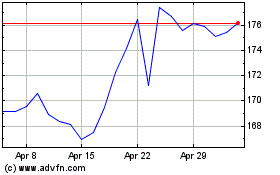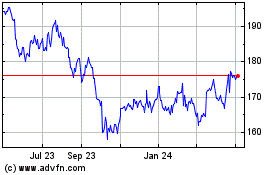PepsiCo to Acquire Rockstar in a Grab for Energy Drinks -- WSJ
March 12 2020 - 3:02AM
Dow Jones News
By Cara Lombardo
This article is being republished as part of our daily
reproduction of WSJ.com articles that also appeared in the U.S.
print edition of The Wall Street Journal (March 12, 2020).
PepsiCo Inc. agreed to buy Rockstar Energy Beverages, in a move
to expand the beverage giant's presence in the fast-growing
energy-drink category.
PepsiCo is to pay $3.85 billion for closely held Rockstar, the
companies said Wednesday, confirming an earlier Wall Street Journal
report.
PepsiCo and rivals including Coca-Cola Co. have been working for
years to shift their beverage sales away from sugary sodas and
toward lower-calorie offerings including water and tea as well as
coffee drinks.
Energy drinks are a weak spot for both Coca-Cola and PepsiCo,
and neither owns a major brand in the category. Coke, which owns a
stake in Monster Beverage Corp. and distributes its products,
recently launched an energy drink in the U.S. over Monster
Beverage's objections.
Rockstar, which PepsiCo already distributes, is one of a handful
of major energy-drink brands. The entrepreneur Russell Weiner
founded the company in 2001, when Rockstar was the first energy
drink to come in now-ubiquitous 16-ounce cans. The number of
energy-drink offerings has since exploded and begun edging out
sodas for space in store coolers. Austria-based Red Bull GmbH and
Monster Beverage dominate the market, which in addition to Rockstar
counts another brand, Bang, as a significant player.
In addition to traditional energy drinks with loud labels and
flavors including Killer Black Cherry, Rockstar makes several
sugar-free and low-calorie energy drinks as well as an organic
version and others made with fruit juice.
The deal marks the first big move since Ramon Laguarta took over
as PepsiCo's chief executive from Indra Nooyi in 2018. The
Purchase, N.Y., company's last multibillion-dollar deal was the
acquisition of SodaStream, the seltzer-machine maker. Mr. Laguarta
was deeply involved in that deal, which came in the final months of
Ms. Nooyi's tenure.
While PepsiCo has distributed Rockstar drinks in North America
since 2009, the existing agreement limits what it can do with other
external brands and with those it sells under its own Mountain Dew
label.
Once the deal closes, PepsiCo could do more with its Mountain
Dew brands, including Kickstart and Game Fuel, and potentially
distribute other energy-drink brands. It would also be able to
expand distribution and product offerings under the Rockstar
brand.
Buying Rockstar "gives us the ability to play in energy from
soup to nuts," PepsiCo Chief Financial Officer Hugh Johnston said
in an interview.
It should also enable the company to sidestep any legal tussle
like the one that ensnared Coca-Cola. PepsiCo's rival has for years
held a significant stake in Monster Beverage. Coca-Cola last year
won an arbitration claim that allows it to expand sales of its own
Coke-branded energy drinks after Monster Beverage tried to stop the
rollout.
When Mr. Laguarta was asked about PepsiCo's energy-drink
strategy on its earnings call last month, he pointed to success in
a partnership with Starbucks Corp. that allows PepsiCo to sell
ready-to-drink coffee beverages and said it plans to do "a better
job with Rockstar," without further elaborating.
Write to Cara Lombardo at cara.lombardo@wsj.com
(END) Dow Jones Newswires
March 12, 2020 02:47 ET (06:47 GMT)
Copyright (c) 2020 Dow Jones & Company, Inc.
PepsiCo (NASDAQ:PEP)
Historical Stock Chart
From Mar 2024 to Apr 2024

PepsiCo (NASDAQ:PEP)
Historical Stock Chart
From Apr 2023 to Apr 2024
